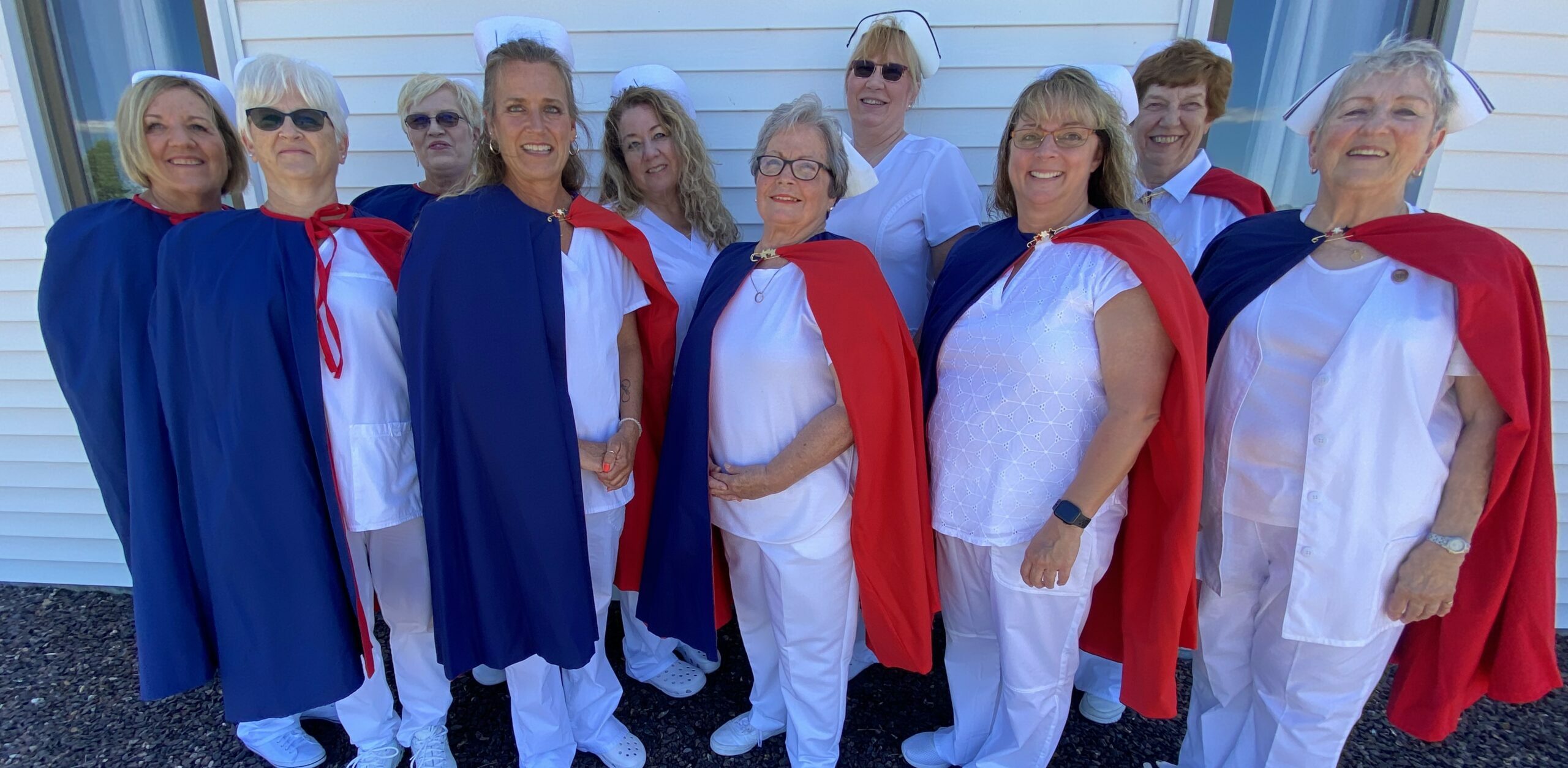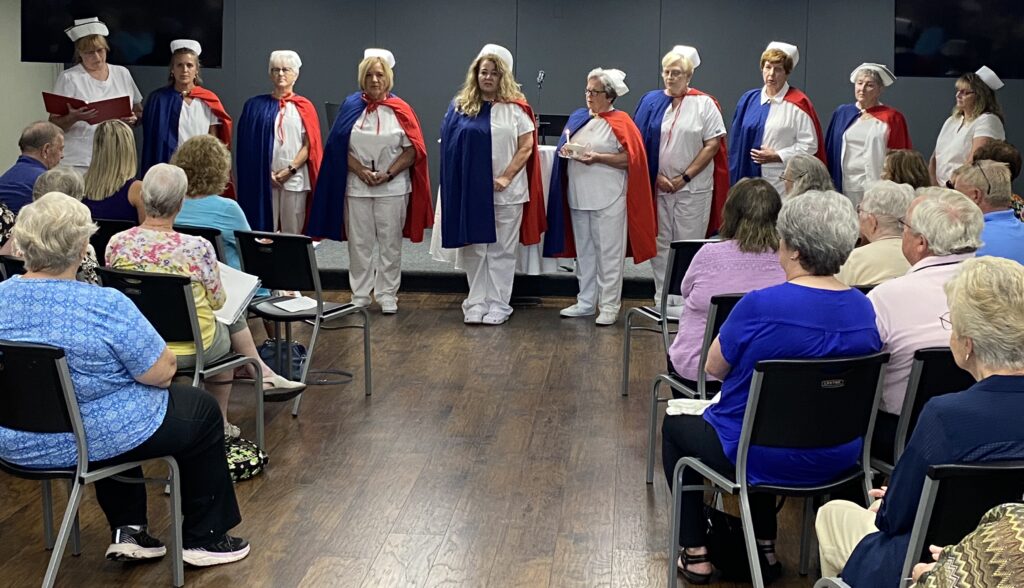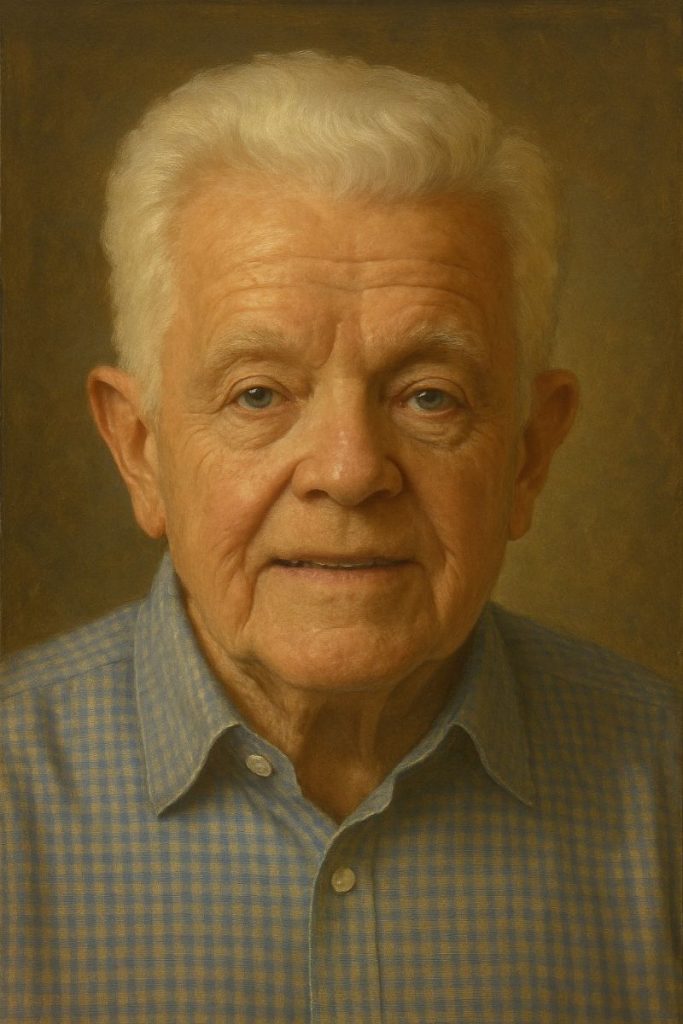‘It is an honor to do this for our colleagues’: Local honor guards recognize nurses during funeral ceremonies

QUINCY — Lisa Surratt has been a nurse for 44 years, but she had never heard of a nurses honor guard before she attended a funeral last September for long-time friend Sharon Giles, a nurse at Blessing Hospital for 45½ years.
A nurses honor guard pays tribute to nurses at the time of their death. The service, similar to a military tribute, officially releases a nurse from their nursing duties.
“They did the service in Mount Sterling, and (a nurses honor guard) from Pike County came down and did it for her.” Surratt said. “My husband is a minister and was preparing for the funeral, and I told him I had to get (the Pike County guard) to come in for Sharon. I contacted Jamie Hendricker (with Hendricker Funeral Home) about it, and he said, ‘I’ve already got that lined up.’
“Then after I saw it myself, I thought, ‘We have to get more people involved.’ That night, I told Jamie we would have a local chapter before the end of the year.”
Surratt, who lives in Mount Sterling, since has created nurses honor guards in Brown County and Adams County. Most of the 23 people with the guard in Adams County have been nurses for more than 20 years. Several are retired, but Surratt still works in intensive care at Blessing Hospital.
A nurses honor guard dresses in the traditional white uniform, complete with white cap, white shoes and cape, then performs a ceremony that takes about five minutes. It comprises reciting the Nightingale Tribute and the laying of a white rose on the casket or next to the urn, symbolizing the nurse’s dedication to the profession.
The Nightingale Tribute — a tribute to Florence Nightingale, the founder of modern nursing — begins with a synopsis of the nurse’s career, followed by this passage:
Nursing is a calling, a lifestyle, a way of living. Nurses here today honor our colleague (name of nurse), who is no longer with us and their life as a nurse. (Name of nurse) is not remembered by his/her (number of) years as a nurse but by the difference he/she made during those years by stepping into people’s lives, by special moments.
When a calming, quiet presence was all that was needed, (nurse) was there.
In the excitement and miracle of birth or in the mystery and loss of life, (nurse) was there.
When a silent glance could uplift a patient, family member or friend, (nurse) was there.
At those times when the unexplainable needed to be explained, (nurse) was there.
When the situation demanded a swift foot and sharp mind, (nurse) was there.
When a gentle touch, a firm push, or an encouraging word was needed, (nurse) was there.
In choosing the best one from a family’s “Thank You” box of chocolates, (nurse) was there.
To witness humanity—its beauty, in good times and bad, without judgment, (nurse) was there.
To embrace the woes of the world, willingly, and offer hope, (nurse) was there
And now, that it is time to be at the Greater One’s side, (nurse) is there.

After the honor guard recites the Nightingale Tribute, the nurse’s name is called three times. A nurse rings a triangle after each call of the name. After the roll call, the honor guard speaks the words that the nurse is officially released from their nursing duties. The honor guard then extinguishes a lit lamp, carried to the front of the room at the beginning of the ceremony, and presents it to the family.
Surratt said the honor guard performs ceremonies at visitations, before funerals or after funerals.
The lamp refers to the time when Nightingale would carry a lamp or lantern when making the rounds of wounded soldiers at night during the Crimean War. She said the white outfit and red/blue cape requirement also have historical value.
“In a military honor guard, you put on your best clothes,” Surratt said. “Unfortunately, nurses don’t wear their whites anymore. Most of them are in their scrubs. We go back to the old tradition of wearing white shoes, white top, white bottoms or a white dress, and then we wear a cape. When Florence Nightingale was in nursing, she went out into the battlefields. The red was so people knew the medical people were coming on board, plus the cape kept them warm.
“For any of our older nurses, that white hat was a core part of who you were. You were so proud to put on that hat.”
Surratt bought 10 hats for nurses who don’t have a hat or misplaced their hat. The nurses honor guard participants also have made 10 capes to be shared.
The Adams County Nurses Honor Guard has performed at 10 funeral services since its creation in February. The Brown County Nurses Honor Guard has performed at four funeral services since its creation in December.
Jill Kelly of Quincy, a nurse for 47 years, takes part because it’s another way to recognize the nursing profession.
“If you could just see the people’s faces when we’re up there,” she said. “That’s what gets me. You just feel the gratitude. It’s such an honor.
“I still remember being in line on Black Friday years ago at Sears, and some lady recognized me. I thought, ‘Oh, she’s going to complain.’ And she said, ‘You were our best advocate for our son.’ It had to be a long time ago, because that had to be when I worked in pediatrics. I didn’t even remember who she was, but that lady still remembered. You never know when you’re going to make a difference.”
A recent appearance by the Adams County Nurses Honor guard at Madison Park Christian Church attracted 10 nurses. Surratt said she’s had as few as three nurses, and in a pinch, she would represent the honor guard by herself.
“We would never turn anybody down,” Surratt said.
The difficulties the medical profession has overcome in the past few years have made Surratt more resolute in her determination to recognize her fellow nurses.
“When you stop and reflect on nurses, the number of people touched by nurses is just immense,” she said. “You may be there, holding somebody’s hand as they draw their last breath. You may be there giving them a shoulder to cry on. Sometimes, a nurse’s presence was enough to calm things down.
“I look to the mentors I learned from and learn from the difficulties that they went through long before we did — sterilizing their own needles, mixing their own medicines. In today’s world, we are so advanced, but yet a nurse still must have the same nursing qualities. it is an honor to do this for our colleagues.”
“This is a little thing, but it’s a big deal,” Kelly said.
Adams County Nurses Honor Guard members
Carolyn Summers, 59 years
Sharon Sandidge, 55 years
Mary Lyn Tucker, 50 years
Patti Kunkel, 48 years
Jill Kelly, 47 years
Iris Trantham, 47 years
Penny Musolino, 46 years
Robin Northup, 45 years
Lisa Surratt, 44 years
Karen Neiders, 42 years
Cathleen Koch, 42 years
Mary Reich, 38 years
Lois Hamilton, 38 years
Michelle Summy, 34 years
Lisa Berry, 33 years
Peggy Austin, 32 years
Sue McNeff, 30 years
Traci Conover, 27 years
Leah Heming, 24 years
Lori McClenning, 22 years
Jessica Nuebel, 20 years
Carrie Parker, 14 years
Kaitlyn Hocking, 4 years
Mary Kay Waldhaus
Miss Clipping Out Stories to Save for Later?
Click the Purchase Story button below to order a print of this story. We will print it for you on matte photo paper to keep forever.

